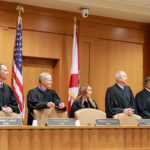Civil Appeals
Disputes concerning business matters, commercial transactions, real estate, personal injury, family law and a myriad of other matters are all covered under the broad term of civil appeals. Civil appellate practice is essentially the appeal of any matter which does not originate in a criminal prosecution.
Applicable rules of procedure often impose strict deadlines within which to file a notice of appeal to initiate appellate proceedings after a trial court has ruled against you. Therefore, it is imperative to consult an experienced appellate attorney at the first available opportunity.
Some clients retain us during the pre-trial or trial stages in a proceeding to ensure that they do not waive any rights on appeal by failing to make proper objections or requests at trial. Proper planning for an appeal begins at the pre-trial level because an appellate court is generally unable to consider any evidence, testimony, or arguments not considered by the trial court. It is critical to make all viable arguments to the trial court so that an appellate court can even consider the issue. Further, skilled appellate counsel can often complement the skills of a trial lawyer due to their increased emphasis on legal research and writing skills.
Some common issues that are litigated in civil appeals are motions to dismiss, motions in limine, motions for summary judgment, motions for protective orders, motions for summary judgment, motions to qualify expert witnesses, requests for jury instructions, rulings expanding or limiting discovery, juror misconduct, motions seeking to disqualify a judge based on bias or a conflict of interest, verdicts, final judgments and the propriety of monetary damages.
The appellate process is initiated by filing a notice of appeal. It is then necessary to order any necessary transcripts to include as part of the record on appeal that is transmitted to the appellate court. This is a critical juncture in the appellate process because a qualified appellate attorney must identify those documents and records which will assist the appellate court in its decision-making process. If documents are not included in the record the appellate court may not consider them.
Once all transcripts and records are delivered to the court, the parties then submit their briefs on the merits. A well-written appellate brief contains a concise explanation of the procedural and factual history of the case, provides an accurate recitation of the evidence and testimony from trial, cites to valid legal authority, and persuasively argues why the appellate court should rule in a party’s favor. Effective appellate advocacy is an art form which requires a unique skillset and experience which is completely different from that of trial court litigation. The attorneys at Xander Law Group possess the experience and talent necessary to provide quality representation on appeal to both appellees and appellants in nearly any circumstance.
There is nothing fast about the appellate process except in some limited circumstances mostly involving interlocutory appeals before a final judgment is rendered in a trial case. The rules of appellate procedure impose strict deadlines on all parties to an appeal and it is common for motions for extension of time to be granted enlarging filing deadlines. There is typically a flurry of activity when a brief is due which is then followed by long periods of waiting for the opposing side to file their brief. Most courts do not impose any deadline on the court within which a ruling must be reached. However, many appeals are resolved within twelve to twenty-four months. This may seem like a long time, but most trial court cases take longer to resolve than appellate court cases.
The appellate team at Xander Law Group, P.A. consists of several experienced attorneys that are prepared to evaluate your case and assist in any capacity possible.
Sample of Prior Experiences and Results in Civil Appellate Matters:
Bensoussan, et al. v. Cohen, et al., 3D17-1493 (Fla. 3d DCA 2018)
Successfully convinced the Third District Court of Appeal to reverse the dismissal with prejudice of a case filed by former homeowners who had lost their home in a foreclosure against the party who purchased the home in the foreclosure process. The former homeowners were alleging the civil theft of their personal property left behind in their home when they were forcibly prevented from removing same by the new owner.
Cerasuoli, et. al. v. Deutsche Bank National Trust, etc., 4D15-614 (Fla. 4th DCA 2015):
Submitted appeal for a condominium owner who had a judgment of foreclosure entered against him. The bank failed to properly consider a renegotiated repayment plan or short sale. The attorneys at Xander Law group were able to successfully negotiate with the mortgage holder even after foreclosure was granted and the home owner was able to obtain a favorable outcome with agreeable terms with the bank.
DSLRPros, Inc., et al. v. Lalo, 3D17-2715 (Fla. 3d DCA 2018)
Successfully convinced the Third District Court of Appeal to reverse a judgment entered against two corporations which was entered after the corporations’ pleadings were stricken due to a failure to comply with court orders. The appellate court held that the trial court failed to make the necessary findings required under Florida law to support such relief.
Gomez v. Gomez, 3D16-511 (Fla. 3d DCA 2017):
Represented elderly couple who were being evicted from their home by their own children. After successfully two interlocutory appeals in this action, the attorneys at Xander Law group were able to successfully convince a panel of judges at the third District Court of Appeals during oral argument at the University of Saint Thomas Law School that it was proper to strike the appellant’s pleadings with prejudice for repeated failures to comply with court orders. This case was specially selected by the District Court of Appeal as a case of particular interest with highly qualified counsel to be debated before the student body of a local law school. This is the only Florida case that has upheld the most extreme sanction of dismissing a party’s pleadings with prejudice as a sanction.
Hempstead Marine, Inc. v. R&I Shipping Line, LLC, 3D17-1155 and 3D17-1161 (Fla. 3d DCA 2018)
Successfully argued for the Florida Third District Court of Appeal to affirm a trial verdict against a tugboat company for breach of contract. The tugboat company was alleging various issues pertaining to the admissibility of evidence and the calculation of damages. Based on the arguments of Xander Law Group, the Florida Third District Court of Appeal summarily upheld the verdict against the tugboat company.
Rudoy v. Rudoy, 3D15-1893 (Fla. 3d DCA 2016):
Represented appellee in a same sex divorce matter in which the appellant complained that the parties did not consummate their marriage. The attorneys at Xander Law Group, P.A. were able to successfully argue that there was sufficient evidence to illustrate that a valid marriage existed and that the appellee was able to maintain the immigration benefits conferred upon him by the marriage. Our attorneys also successfully argued that the appellant failed to provide a sufficient record on appeal and waived his appellate rights by failing to follow proper procedures for reconstructing a record on appeal where no transcript was available.













